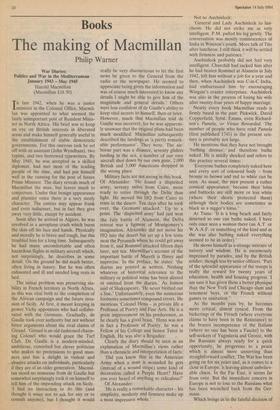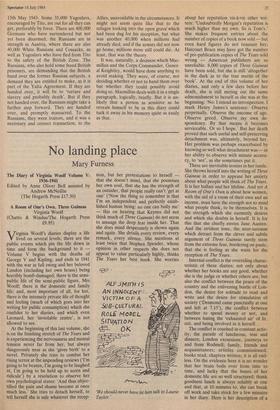Books
The making of Macmillan
Philip Warner
War Diaries: Politics and War in the Mediterranean January 1943 — May 1945 Harold Macmillan (Macmillan £18.50)
In late 1942, when he was a junior minister in the Colonial Office, Macmil- lan was appointed to what seemed the fairly unimportant post of Resident Minis- ter in North Africa. His brief was to keep an eye on British interests in liberated areas and make himself generally useful in the establishment of stable democratic governments. For this onerous task he set off with an assistant (John Wyndham), two typists, and two borrowed typewriters. By May 1945, he was accepted as a skilled diplomat, had met most of the leading people of the time, and had put himself well in the running for the post of future Prime Minister. The diary reveals much of Macmillan the man, but leaves much to conjecture. Under that benign appearance and plummy voice there is a very steely character. The entries may appear frank and even indiscreet, but in fact they give away very little, except by accident.
Soon after he arrived in Algiers, he was involved in a aeroplane crash which burnt the skin off his face and hands. Physically and morally he is brave and tough, but this troubled him for a long time. Subsequently he had many uncomfortable and often hazardous flights in military aircraft which, not surprisingly, he describes in some detail. On the ground he did much better, often living in luxury. But he was often exhausted and ill and needed long rests in bed.
The initial problem was preserving sta- bility in French territory in North Africa, as this was vital both to the completion of the African campaign and the future inva- sion of Sicily. At first, it meant keeping in power Vichy appointees who had collabo- rated with the Germans. Gradually, de Gaulle took over authority but not without bitter arguments about the rival claims of Giraud. `Giraud is an old-fashioned charm- ing Colonel who would grace the Turf Club. De Gaulle is a modern-minded, ambitious, conceited but clever politician who makes no pretensions to good man- ners and has a delight in violent and abusive attacks on individuals, particularly if they are of an older generation.' Macmil- lan stood no nonsense from de Gaulle but somewhat surprisingly took it on himself to tell him of the impending attack on Sicily. 'I had no instruction to do this (and thought it wiser not to ask for any or to consult anyone), but I thought it would
really be very discourteous to let the first news be given to the General from the radio or the newspaper. He seemed to appreciate being given the information and was of course much interested to know any details I might be able to give him of the magnitude and general details.' Others were less confident of de Gaulle's ability to keep vital secrets to himself, then or later. However, much that Macmillan told de Gaulle was incorrect, for he was apparent- ly unaware that the original plans had been much modified. Macmillan subsequently described the landings as 'a pretty remark- able performance'. They were. The air- borne part was a disaster, seventy gliders landing in the sea, a number of our own aircraft shot down by our own guns, 2,000 British and 3,000 Americans dropped in the wrong place.
Military facts are not strong in this book. Of Alexander: 'He found a dispirited army, seventy miles from Cairo, more ready to retire through the Delta than fight. He moved his HQ from Cairo to tents in the desert. Ten days after he took over, the Germans attacked.' Up to a point. The 'dispirited army' had just won the July battle of Alamein, the Delta retreat was a figment of Montgomery's imagination, Alexander did not move his HQ into the desert but set up a few tents near the Pyramids where he could get away from it, and Rommel attacked fifteen days later, not ten. Macmillan's account of the important battle of Mareth is flimsy and imprecise. In the preface, he states: 'the diaries are printed as written. Nothing whatever of historical relevance to the military or political scene has been altered or omitted from the diaries.' As Jonson said of Shakespeare, 'He never blotted out a line.' Unfortunately, even the numerous footnotes sometimes compound errors. He mentions 'Colonel Henn — in private life a Professor of Poetry and Fine Arts. He is a great improvement on his predecessor, as he clearly has a good brain.' Henn was not in fact a Professor of Poetry, he was a Fellow of his College and Senior Tutor in English. He was also a Brigadier.
Clearly the diary should be seen as an explanation of Macmillan's views rather than a chronicle and interpretation of facts: `Did you know that in the American Army when a man is wounded he gets (instead of a wound stripe) some kind of decoration called a Purple Heart? Have you ever heard of anything so ridiculous'?'
Of Alexander: 'He is really a remarkable character — his simplicity, modesty and firmness make up a most impressive whole.' Not so Auchinleck: 'General and Lady Auchinleck to lun- cheon. He did not strike me as very intelligent. P.M. pulled his leg gently. The conversation was mostly reminiscences of India in Winston's youth. More talk of Tito after luncheon. I still think it will be settled with firmness and patience.'
Auchinleck probably did not feel very intelligent. Churchill had sacked him after he had beaten Rommel at Alamein in July 1942, left him without a job for a year and then, when Auchinleck was C-in-C India, had embarrassed him by encouraging Wingate's crazier enterprises. Auchinleck was also in the process of losing his wife after twenty-four years of happy marriage.
Nearly every book Macmillan reads is firmly based in the past: Pickwick, David Copperfield, Sybil, Emma, even Richard- son's Pamela, or Virtue Rewarded. The number of people who have read Pamela (first published 1741) in the present cen- tury is probably not large.
He mentions that they have not brought 'bathing dresses' and therefore bathe naked. He is mildly shocked and refers to this practice several times: 'Everyone bathes completely naked here and every sort of coloured body — from bronze to brown and red to white can be seen. As usual, the men present a rather comical appearance, because their loins and buttocks are still more or less white (where their shorts protected them) although their bodies are sometimes as black as a nigger's torso.'
At Tunis: 'It is a long beach and fairly deserted so one can bathe naked. I have only once seen a woman there (an A.T. or W.A.A.F. or something of the kind and as she was also bathing naked everything seemed to be in order).'
He shows himself as a strange mixture of naivety and wisdom. He is enormously impressed by parades, and by the British soldier, though less by senior officers. 'Part of the splendid appearance of the troops is really the reward for twenty years of education, health and housing progress. I am sure it has given them a better physique than the New York and Chicago slum and tenement boys, or the French without games or sanitation.'
As the months pass by, he becomes more critical, almost cynical. From the bickerings of the French (where everyone claims to have been in the Resistance) to the brazen incompetence of the Italians (where no one has been a Fascist) to the self-seekers of Yugoslavia and Greece, with the Russians always ready for a quick opportunity, he progresses to a peace which is almost more unnerving than straightforward conflict. The War has been going on for six years and, as it comes to a close in Europe, is leaving almost unbeliev- able chaos. In the Far East, it seems far from over. But the immediate concern in Europe is not to lose to the Russians what has been wrenched back from the Ger- mans.
Which brings us to the fateful decision of 13th May 1943. Some 35,000 Yugoslays, encouraged by Tito, are out for all they can get, preferably by force. There are 400,000 Germans who have surrendered but not yet been disarmed; the Russians are in strength in Austria, where there are also 40,000 White Russians and Cossacks, as well as Yugoslays who have fled from Tito to the safety of the British Zone. The Russians, who also hold some freed British prisoners, are demanding that the British hand over the former Russian subjects, a demand they are entitled to make, as it is part of the Yalta Agreement. If they are handed over, it will be to 'torture and slavery and probably death'. But if they not handed over, the Russians might take a further step forward. They are handed over, and promptly massacred. To the Russians, they were traitors, and it was a necessary and correct transaction; to the Allies, unavoidable in the circumstances. It might not seem quite like that to the refugee looking into the open grave which had been dug for his reception, but what was another 40,000 when millions had already died, and if the armies did not now go home, millions more still could die. At least, that was the theory.
It was, naturally, a decision which Mac- millan and the Corps Commander, Gener- al Keightley, would have done anything to avoid making. They were, of course, not deciding whether or not to hand them over but whether they could possibly avoid doing so. Macmillan deals with it in a single paragraph, logically, briefly. But it is un- likely that a person as sensitive as he reveals himself to be in this diary could tuck it away in his memory quite as easily as that.















































 Previous page
Previous page